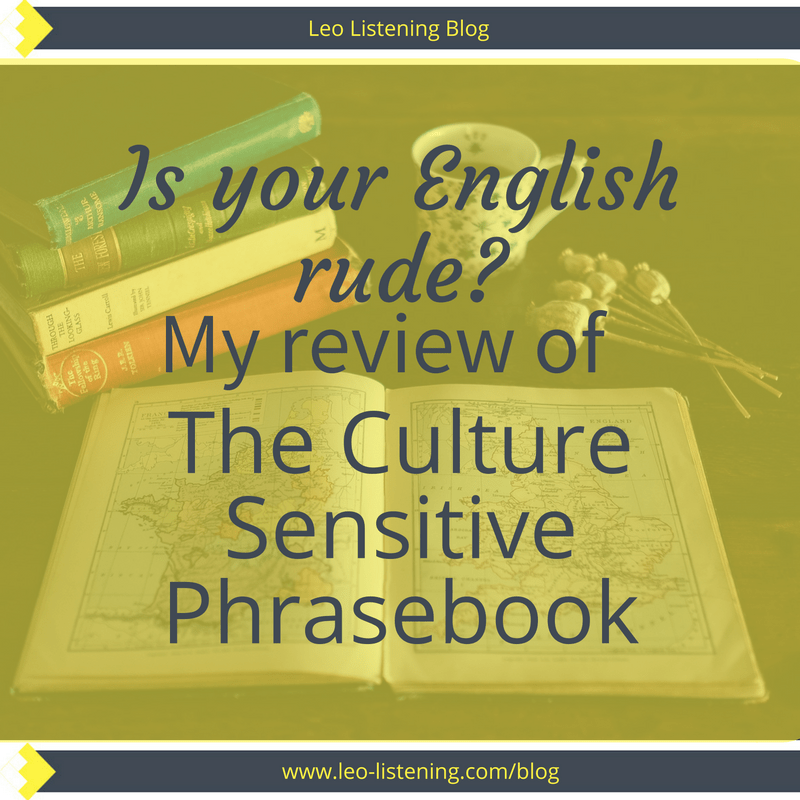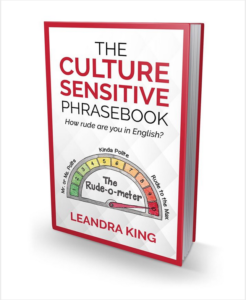Is Your English Rude? My Review Of The Culture Sensitive Phrasebook

Do you remember Leandra? I interviewed her in podcast episode 10. She talked about visiting and later living in France, on the beautiful island of Martinique.
She revealed that she didn’t have the cultural knowledge she needed to fit in with natives. In spite of a high level of French. She made some embarrassing mistakes which she discussed in the episode.
She’s now released her first e-book, The Culture Sensitive Phrasebook: How Rude Are You in English?

You probably consider yourself a polite person, right? I mean, most of the time, no-one intends to be rude. Politeness is what holds social interactions together.
So Why Would You Ask Yourself The Question – How rude Is My English?
Well, each culture has its own internal rules about what’s considered rude or polite. In France, it’s normal to kiss people on the cheeks when you see them. Or even when you first meet them. In English-speaking countries, this is something you only do with close friends or family.
In French workplaces, you have to shake hands with colleagues every time you see them. In English-speaking cultures, you shake hands when you first meet someone. Not every time you see them.
And of course, this extends to language. That’s why Leandra has created this 50-page guide, divided into 6 chapters. In each chapter, you’ll learn the language you can use in 6 culturally-sensitive situations.
Leandra Sums Up The Point Of The Book In The Introduction When She Says:
“In order to fit in and be integrated with native English speakers, you need to understand the culture behind the English language. If you don’t, you’ll always feel like an outsider, even if you’re completely fluent in English.”
In each chapter, Leandra invites you to imagine that you’ve recently arrived in an English-speaking country. The short vignettes help you to put yourself in the shoes of the character in each chapter.
The title “phrasebook” might suggest a simple list of phrases or expressions. But this book is so much more than that. You don’t just learn how to make your language more polite. You learn why you need to use the phrases Leandra teaches you.
Each section is full of details. For instance, in the chapter on making polite requests, you also learn how to interrupt politely. Or how to not impose on people’s time and availability. You also learn the difference between different types of requests and where and when you can use them.
Leandra uses fun analogies and humour to get her point across. For example the recipe for politely turning down an invitation or the chemical formula for giving feedback. I found the guidance in these chapters useful. Even native speakers struggle to politely refuse requests or give negative feedback.
At some points you might feel frustrated. Because you know that you’ve heard English-speaking natives use some of the “rude” forms. Leandra explains the specific contexts in which you can expect to hear them.
In chapter 5 you may wonder if all topics are forbidden in the English-speaking world. But Leandra gives you a list of multiple “safe” topics that you can use without fear of offending people.
The final chapter covers PC language, euphemisms and other sensitive topics. A euphemism is a way to talk about something embarrassing or unpleasant without mentioning the topic. If you can master the language in this chapter, then you’ll sound more natural and less offensive.
Plus Points Of This Book
– it’s a highly-detailed, in-depth guide that’s also enjoyable to read thanks to touches of humour.
– You’ll also learn about how other cultures function. And why they don’t give feedback or deal with awkward topics in the same way as native English speakers.
Minus Points
– some learners might need more guidance on the verb forms to use with certain expressions. You can find some examples in the third section of the chapter on giving feedback. But a reminder of the verb forms would be useful (gerund, base verb, or verb with ‘to’ after each expression).
– It would be great to hear the pronunciation of the different expressions with the right intonation. So that learners know how to sound polite too.
To Sum Up
The Culture Sensitive Phrasebook is a detailed and nuanced look at the role of culture on language. An overlooked topic in the English language world. I’d recommend this book to learners planning to live or work with native English speakers. Especially if you come from a culture where communication is more direct such as Germany or The Netherlands.
NB The links in this post are affiliate links so I will receive a commission if you make a purchase through it. I only support products and services I think are valuable for my audience. Thank you for your support.
About Leandra

Leandra King helps non-native English-speaking expats understand the culture behind the English language so that they can easily socialise and fit in with their native English-speaking friends and colleagues, even if they are introverts. You can read her tips over on her blog at English with Leandra.
Photo credits
Blog post image photo: Available at https://stocksnap.io/photo/5GFBNEWEXA